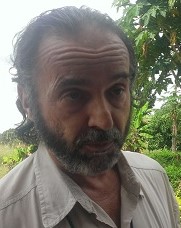 The Ceasefire and Transitional Security Arrangements Monitoring Mechanisms (CTSAMM) has said South Sudanese should bring all their efforts together to work and attain “real peace”.
The Ceasefire and Transitional Security Arrangements Monitoring Mechanisms (CTSAMM) has said South Sudanese should bring all their efforts together to work and attain “real peace”.
He said citizens, religious leaders, civil society, and political leaders should join efforts to achieve the peace objective.
(Left) Dan Lizzul, Chairman of the Ceasefire Transitional Security Arrangement Monitoing Mechanism (CTSAMM). He urged all South Sudanese to work for peace and stability of the country.
“UNMISS, CTSAMM, and members of the international community can help in the peace process. We can do monitoring and verification, we can try to provide some assistance, but the real peace has to be implemented by the people of South Sudan,” Dan Lizzul, CTSAMM’s Chairman told journalists in Yei on Thursday.
“By everybody working together… we mean everyone has to work together towards the same goal,” he said.
South Sudan slipped into civil war in 2013, when forces loyal to President Salva Kiir clashed with those loyal to his former deputy, Riek Machar, in the capital Juba, in what has long been described as a political power struggle.
Machar returned to Juba in 2015 after both sides signed a peace deal to end the conflict. However, he was forced into exile following the renewed clashes between his forces and those of president Kiir in July 2016. He was replaced by General Taban Deng Gai, as the country’s first Vice President in the Transitional Government of National Unity (TGoNU).
However, reports of fighting in other parts of the country continue to violate the ceasefires both leaders had declared earlier this year.
As members of the international community keep providing assistance, Lizzul said South Sudanese should demonstrate their genuine efforts for lasting peace.
“The real effort, progress and objective have to be desired and attained by the people of South Sudan,” he said.
Lizzul added that the process of implementing peace needs parties to the agreement to stop violent approaches and to value continued dialogue with the goal of conflict resolution.
“Democracy needs more than one day. Democracy needs several days. It includes discussions; when you have discussions, you have disagreement. When you have disagreements, you won’t resolve issues sometimes, and sometimes you will have debates and dialogue. And possibly, all those will result in reconciliation and a peaceful resolution of problems rather than a violent resolution,” he said.
He spoke to TCT at the sidelines of a workshop organized by United Nations Mission in South Sudan (UNMISS) in Yei on civil military relations.
Over 56 participants including government officials, religious leaders, and community and civil society leaders participated in the workshop.
Participants said the workshop came at the right time as Yei has been facing rising insecurity, which is causing the displacements and the fleeing of residents to neighboring countries for refuge.
Jacob Aligo Lo-Ladu, a member of parliament in Yei River State, said such dialogues could enable them to discover ways in which to rebuild relations between the military and civil population, and also encourage youth in armed opposition groups to pursue dialogue in resolution of grievances.
He called for unity of South Sudanese people to improve security and to attain lasting peace and stability in the country.
“We need total peace for the whole of the republic of South Sudan. We have fought enough, we have shed enough blood. I think time has come for us to talk among ourselves, go to the drawing board and see where we have gone wrong and fix the problem,” he said.


